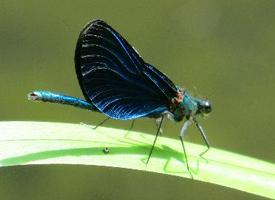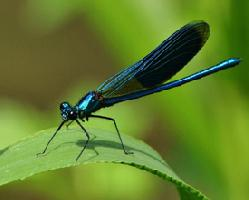
Weights and measures
| Length | from 4,5 to 5 cm |
|---|---|
| Wingspan | from 6 to 7 cm |
State of endangerment
| Non Endangered |
Animal description
The Beautiful demoiselle (Calopteryx virgo) is a captivating species of damselfly that graces various freshwater habitats across Europe and into parts of Asia. This enchanting insect is a member of the broad-winged damselfly family, Calopterygidae, which is renowned for its strikingly colored and patterned wings.Adult Beautiful demoiselles exhibit pronounced sexual dimorphism, meaning males and females can be easily distinguished by their appearance. Males are particularly striking, with metallic blue bodies and broad, dark blue wings that may appear almost black in certain lights. The intensity of the blue coloration can vary geographically, adding to the allure of spotting these creatures in the wild. The wings of the male are uniquely pigmented, lacking the pterostigma (a small, often differently colored area at the wing's edge) found in many other damselfly species. Instead, their wings display a captivating iridescence that can shift in hue and intensity with the angle of light, making them a splendid sight in their natural habitats.
Females, on the other hand, are more subdued in color. Their bodies range from metallic green to bronze, and their wings are a pale brown or greenish, with a white pseudo-pterostigma, making them more camouflaged against the vegetation than the males. Both sexes have long, slender bodies typical of damselflies and large, compound eyes that give them excellent vision for spotting prey and avoiding predators.
Beautiful demoiselles are usually found near slow-flowing streams and rivers, particularly those with abundant vegetation. These habitats provide the larvae, also known as nymphs, with ample hiding spots from predators and plenty of food sources, such as small aquatic invertebrates. The nymphs themselves are fascinating creatures, equipped with extendable mouthparts they use to snatch their prey. They undergo several molts as they grow, eventually emerging from the water to molt one final time into their adult form.
Adults primarily feed on small flying insects, which they catch with impressive agility in mid-air. The mating ritual of the Beautiful demoiselle is a mesmerizing dance, where males display their vibrant wings to attract females. After mating, females lay their eggs on submerged vegetation, completing the life cycle.
The presence of the Beautiful demoiselle is often an indicator of good water quality, making these insects important bioindicators in their ecosystems. However, like many species dependent on specific habitats, they are vulnerable to pollution, habitat destruction, and climate change. Conservation efforts are crucial to ensuring that these beautiful insects continue to thrive and enchant future generations.
In summary, the Beautiful demoiselle is a stunning example of the beauty and complexity found within the natural world. From their dazzling colors to their intricate life cycles and ecological importance, these damselflies captivate the attention of scientists, nature enthusiasts, and casual observers alike, reminding us of the intricate connections within ecosystems and the importance of preserving natural habitats.
Similar Animals
New photos of animals
Top 10 animals
- Dolphin gull (Leucophaeus scoresbii)
- Diana monkey (Cercopithecus diana)
- Moustached guenon (Cercopithecus cephus)
- Galápagos tortoise (Geochelone nigra complex)
- Japanese macaque (Macaca fuscata)
- Stone loach (Barbatula barbatula)
- Russian tortoise (Testudo horsfieldii)
- Greek tortoise (Testudo graeca)
- Common flying dragon (Draco volans)
- Vendace (Coregonus albula)
